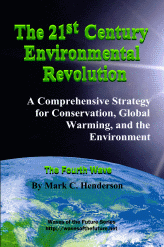The 21st Century Environmental Revolution: a Comprehensive Strategy for Conservation, Global Warming and the Environment by Mark C. Henderson
Share
 A book review by David McCorquodale
A book review by David McCorquodale
Green Party of Delaware
The Fourth Wave, this book by Canadian Mark Henderson is an effort to envision how an environmental revolution would change mankind and suggest initial steps to make such a change possible. Proceeding from the premise that just as the information age has changed the way human beings interact as described by Alvin Toffler in The Third Wave, so too will the environmental revolution change mankind by putting ìa stop to the chronic and wanton destruction of the planet and to the reckless wasting and plundering of non-renewable resources.î
 Subtitled The key recommendation for this transformation is to create a different type of taxation system by eliminating consumption taxes and drastically reducing income taxes on the average working person and, instead, putting in place an environmental taxation system (ETS). This system would levy taxes based on the environmental impact or scarcity of three classes of substances: metals, toxic compounds, and fossil fuels. Similarly, taxes would be levied on packaging.
Subtitled The key recommendation for this transformation is to create a different type of taxation system by eliminating consumption taxes and drastically reducing income taxes on the average working person and, instead, putting in place an environmental taxation system (ETS). This system would levy taxes based on the environmental impact or scarcity of three classes of substances: metals, toxic compounds, and fossil fuels. Similarly, taxes would be levied on packaging.
ETS would create much more disposable income for individuals, but products would cost much more, depending on the environmental impact of the product. In the beginning, the amount of tax raised by the new system would equal the old taxation system. But individuals and businesses would rapidly begin to change their consumption patterns to reduce costs and would begin to consume in a more sustainable pattern.
The key recommendation for this transformation is to create a different type of taxation system.
The author points to several possible positive developments from such a system. The taxation bureaucracy would be simplified, with costs levied at the basic level and passed on up the chain of manufacturing to the consumer, instead of levying taxes at every point in the chain. Markets for recycling and renewables would dramatically expand, as limited resources are deemed valuable, instead of viewed as trash. ìThe ETS would rely on government for general directions and on the market for complex decisions,î without burdening businesses with reams of paperwork to comply with environmental regulations as happens currently. The logic of the system would lead business enterprises into doing what is right for the planet because it is also the profitable way to proceed.
The book, which is presented as the first of a series by publisher Waves of the Future, leaves some issues unaddressed. While nuclear power is derived from toxic metals, the author did not specifically address the issue, which many politicians, in the thrall of the energy companies, have pushed as an intermediate solution to dependence on foreign oil.† The author’s model is based on Canada, which is both a less complex economic model and more progressive already than the United States.
Perhaps the thorniest unmentioned problem is the question of how to put the ETS into law when politicians are beholden to corporations whose business model is based on waste. In a country where over half of the federal budget goes to ìdefenseî, including wasteful armaments production, and every state gets handouts to keep the addiction going, how do we start the process of weaning the economy from wasteful production?
The author acknowledges the ETS system is not the final answer because it does not assume a reduction in consumption, which would mean unemployment, and which would be politically unpopular. But it would make the products we buy greener. If population continues to increase, even the ETS may not be enough. But it would be an intermediate step that could start humanity on the road to a greener future. Greens who wish to convince others that they can to lead society toward sustainability should become familiar with these ideas.





it seems that the only solution to global warming is the reduction of CO2 and CFCs;:’